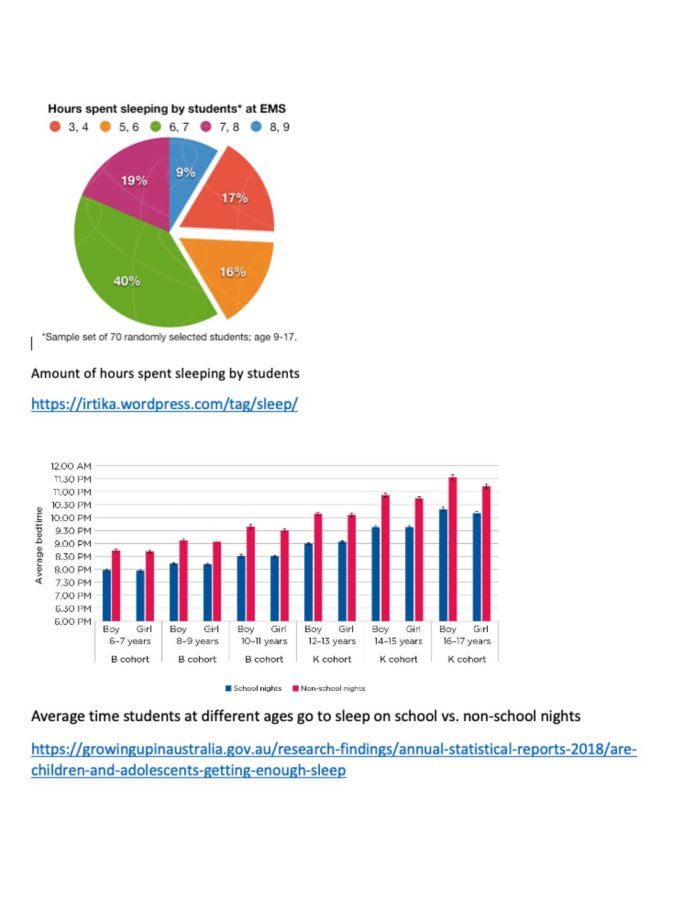Should Schools Start Later?
January 24, 2022
Every morning at 7:15 students throughout the school hear the screeching of the intercom announcing the beginning of the school day with an ear-piercing “Good morning Huntingtown High school!” Chairs scooting back as everyone groggily stands up to recite the Pledge of Allegiance. Plopping back down as soon as it’s over and flopping their heads down onto the desks. The predominantly stale air circulating through the classroom. How can anyone be productive when they’re forced to get up hours before their bodies want them to?
The Science of It
Teenagers biologically go to sleep later and sleep for longer in the morning. It’s just something our bodies are wired to do. Teens are advised to sleep for 8-10 hours each night, but with school and extracurricular activities, along with all the extra stuff parents require us to do, it’s not a realistic goal for everyone. However, these hours are crucial to our developing brains, affecting everything from our physical well-being to mental health. Sleep deprivation can also be detrimental to one’s school performance.
According to the Washington Post, high school students are assigned 2.7 hours of homework on average. With extracurricular activities in the afternoon, many students stay up late into the night just to complete everything before class the next morning. This leads them to be unable to create a consistent routine for going to sleep each night.
The early start to school is one of the biggest issues for teens. Many teenagers, if left to their own devices, would go to sleep around 12:00 at night and wake up around 9:00 in the morning. This is due to Starting school at 7:15 means most people must be awake at 6:00 at the latest just to catch the bus, which is much earlier that they normally would. With this, most teens are typically getting 6-7 hours of sleep, maximum. However, even though we wake up earlier, teens consistently won’t get tired until late at night. This creates an ongoing cycle, only the weekends providing a brief release.
Your body producing melatonin is a hormone in your body that creates a quiet, peaceful state of mind that helps promote sleep. During puberty melatonin is not produced until later at night. Along with this, people wake up because melatonin stops being produced, and teens’ melatonin doesn’t stop being produced until later in the morning. This means that whatever they do, teens will still always get their burst of energy later in the afternoon.
Effects on Students’ lives
With the lack of sleep many students develop sleep deprivation which is caused by routinely getting not enough sleep. “Let’s say you’re one of the kids that’s only getting 4 hours a night because you work, because you play a sport, or are in the band, or something like that. It takes about 30 days for you to get your sleep to adjust to your clock,” Mrs. Hooper, our school’s wellness coordinator, explained. She also did extensive research before our interview so is well versed on the topic.
Sleep deprivation causes many other effects on people such as concentration, poor decision making, and could eventually lead to mental health issues such as anxiety and depression. With less sleep, people also make more rash and risky decisions. Just like drinking, the possibility of injury on yourself and others increases. Your ability to concentrate also decreases which causes students’ grades to drop. Mrs. Hooper explained that when people are more tired, they also tend to react differently to certain thing, like lashing out at someone for a small comment they made. “The small things will become a big thing because again, you’re tired and you’re not reacting, I don’t want to say normal, but you’re not reacting with the full knowledge because of sleep deprivation.” This can lead to becoming more anxious and stressed about pretty much anything. And both of these things are detrimental to your mental and even social health.
Staff Perspective
Although it’s a widely popular idea that “school should just start later,” there are sensible reasons for the early start. As Mrs. Gray, one of the school’s assistant principals at HHS, told me during our interview, she believes the main motivator is athletics and other after school activities. She rationalized how athletes would have to stay extremely late at school just to practice, and games would be a separate problem. “I mean it gets dark at 5:00,” Mrs. Gray pointed out, “Once we talk about pulling kids out of school to get where they need to get for a game you know?” Separate from the academic aspects, the schedule may be the best for school sports, something that brings all of the student population together.
With the board of education controlling these big decisions there’s not much we can do ourselves as a single school. Even if Huntingtown did move the time of school later in the day, it would clash with all the other schools and counties around us. As Mrs. Gray said, “If we play Saint Mary’s and Charles and they don’t do it, then that would create a lot of conflict as far as times of things and you know stuff like that.” So, there’s not much we can do about the situation at the moment.
However, some schools are starting to do something about the sleep deprivation students are getting. California is the first state to mandate a later start time, which will be fully enforced in the beginning of 2022. Middle school starts no earlier than 8:00, while high schools must start later than 8:30. “Not that Maryland is at the forefront, but we’re usually not at the end either. So, we’re willing to try it if we have somebody else go through with it,” Mrs. Gray explained. Although there’s not much action right now, with all the changes we made throughout Covid times, you never know what may happen.
Tips to Improve Sleep
Be that as it may, there will likely be no change anytime soon; so here are some tips that may help the mornings become a bit less miserable.
- Create a relaxing routine for every night. This can help you wind down and ready your mind for sleep. This may include a shower, listening to relaxing music, reading a book, or doing some simple yoga. It also helps to have a set time for these things so that you typically go to sleep at the same time.
- If things are stressing you out, write them down to allow yourself to put it in the back of your head. Otherwise, they’ll likely plague you as you’re trying to fall asleep
- Avoid devices such as phones and computers for at least an hour before going to bed. Using them too close to when you go to sleep will cause you to have more trouble falling asleep.
- Stay away from things that get you riled up. This could include activities such as sports, homework which may stress you out, or even loud music. These sorts of things keep you pumped up and awake which obviously make it harder to fall asleep.
- Lastly, keep your room dark. Although this may not help everyone bright lights typically keep people awake. Whether it be dimming the lights close to when you go to bed, or keeping your room completely dark at night, it may help you sleep more deeply.
As expressed, there is not much we can do about the time that schools start at this point in time. Just try to look on the bright side of things whenever a morning is particularly rough. And at least we get out early.
Sources:
https://www.rand.org/blog/2020/01/teens-are-driven-to-stay-up-late-but-why.html

